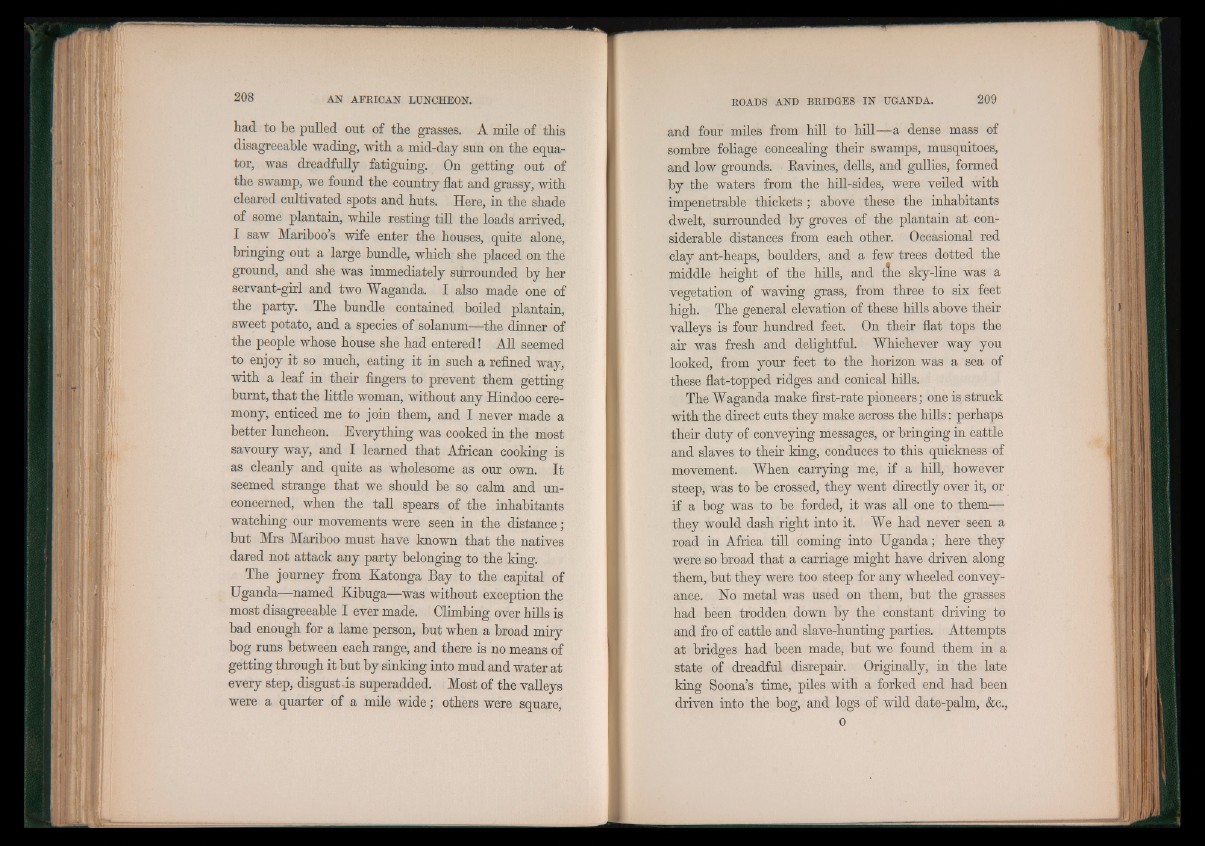
had to be pulled out of the grasses. A mile of this
disagreeable wading, with a mid-day sun on the equator,
was dreadfully fatiguing. On getting out of
the swamp, we found the country flat and grassy, with
cleared cultivated spots and huts. Here, in the shade
of some plantain, while resting till the loads arrived,
I saw Mariboo’s wife enter the houses, quite alone,
bringing out a large bundle, which she placed on the
ground, and she was immediately surrounded by her
servant-girl and two Waganda. I also made one of
the party. The bundle contained boiled plantain,
sweet potato, and a species of solanum—the dinner of
the people whose house she had entered! All seemed
to enjoy it so much, eating it in such a refined way,
with a leaf in their fingers to prevent them getting
burnt, that the little woman, without any Hindoo ceremony,
enticed me to join them, and I never made a
better luncheon. Everything was cooked in the most
savoury way, and I learned that African cooking is
as cleanly and quite as wholesome as our own. It
seemed strange that we should be so calm and unconcerned,
when the tall spears of the inhabitants
watching our movements were seen in the distance;
but Mrs Mariboo must have known that the natives
dared not attack any party belonging to the king.
The journey from Katonga Bay to the capital of
Uganda—named Kibuga—was without exception the
most disagreeable I ever made. Climbing over hills is
bad enough for a lame person, but when a broad miry
bog runs between each range, and there is no means of
getting through it but by sinking into mud and water at
every step, disgust-is superadded. Most of the valleys
were a quarter of a mile wide; others were square,
and four miles from hill to hill—a dense mass of
sombre foliage concealing their swamps, musquitoes,
and low grounds. Bavines, dells, and gullies, formed
by the waters from the hill-sides, were veiled with
impenetrable thickets; above these the inhabitants
dwelt, surrounded by groves of the plantain at considerable
distances from each other. Occasional red
clay ant-heaps, boulders, and a few trees dotted the
middle height of the hills, and tne sky-line was a
vegetation of waving grass, from three to six feet
high. The general elevation of these hills above their
valleys is four hundred feet. On their flat tops the
air was fresh and delightful. Whichever way you
looked, from your feet to the horizon was a sea of
these flat-topped ridges and conical hills.
The Waganda make first-rate pioneers; one is struck
with the direct cuts they make across the hills: perhaps
their duty of conveying messages, or bringing in cattle
and slaves to their king, conduces to this quickness of
movement. When carrying me, if a hill, however
steep, was to be crossed, they went directly over it, or
if a bog was to be forded, it was all one to them—-
they would dash right into it. We had never seen a
road in Africa till coming into Uganda; here they
were so broad that a carriage might have driven along
them, but they were too steep for any wheeled conveyance.
No metal was used on them, but the grasses
had been trodden down by the constant driving to
and fro of cattle and slave-hunting parties. Attempts
at bridges had been made, but we found them in a
state of dreadful disrepair. Originally, in the late
king Soona’s time, piles with a forked end had been
driven into the bog, and logs of wild date-palm, &c.,
o